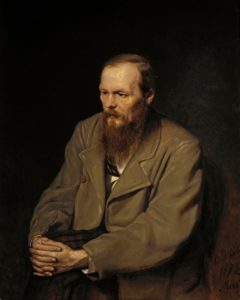Dostoyevsky on Animal Rights and the Deepest Meaning of Human Love
INSPIRATIONAL, 1 May 2023
Maria Popova | The Marginalian – TRANSCEND Media Service
“Treasure this ecstasy; however absurd people may think it.”
“Love the earth and sun and the animals,” Walt Whitman wrote in his timeless advice on living a vibrant and rewarding life — advice anchored, like his poetry, in that all-enveloping totality of goodwill that makes life worth living, advice at the heart of which is the act of unselfing; poetry largely inspired by the prose of Emerson, who had written of the “secret sympathy which connects men to all the animals, and to all the inanimate world around him.”
A quarter century after Leaves of Grass, Fyodor Dostoyevsky (November 11, 1821–February 9, 1881) took up this bright urgency in his final novel, The Brothers Karamazov (public library | public domain) — one of the great moral masterworks in the history of literature.
Dostoyevsky — who felt deeply the throes of personal love — contours the largest meaning of love:
Love every leaf… Love the animals, love the plants, love everything. If you love everything, you will perceive the divine mystery in things. Once you have perceived it, you will begin to comprehend it better every day, and you will come at last to love the world with an all-embracing love. Love the animals: God has given them the rudiments of thought and untroubled joy. So do not trouble it, do not harass them, do not deprive them of their joy, do not go against God’s intent. Man, do not exalt yourself above the animals: they are without sin, while you in your majesty defile the earth by your appearance on it, and you leave the traces of your defilement behind you — alas, this is true of almost every one of us!
In our era of ecological collapse, as we reckon with what it means to pay reparations to our home planet, the next passage rings with especial poignancy, painting the antidote to the indifference that got us where we are:
My young brother asked even the birds to forgive him. It may sound absurd, but it is right none the less, for everything, like the ocean, flows and enters into contact with everything else: touch one place, and you set up a movement at the other end of the world. It may be senseless to beg forgiveness of the birds, but, then, it would be easier for the birds, and for the child, and for every animal if you were yourself more pleasant than you are now. Everything is like an ocean, I tell you. Then you would pray to the birds, too, consumed by a universal love, as though in ecstasy, and ask that they, too, should forgive your sin. Treasure this ecstasy, however absurd people may think it.
Complement with Shelley’s prescient case for animal rights and Christopher Hitchens on the lesser appreciated moral of Orwell’s Animal Farm, then revisit Dostoyevsky, just after his death sentence was repealed, on the meaning of life.
_______________________________________
 My name is Maria Popova — a reader, a wonderer, and a lover of reality who makes sense of the world and herself through the essential inner dialogue that is the act of writing. The Marginalian (which bore the unbearable name Brain Pickings for its first 15 years) is my one-woman labor of love, exploring what it means to live a decent, inspired, substantive life of purpose and gladness. Founded in 2006 as a weekly email to seven friends, eventually brought online and now included in the Library of Congress permanent web archive, it is a record of my own becoming as a person — intellectually, creatively, spiritually, poetically — drawn from my extended marginalia on the search for meaning across literature, science, art, philosophy, and the various other tendrils of human thought and feeling. A private inquiry irradiated by the ultimate question, the great quickening of wonderment that binds us all: What is all this? (More…)
My name is Maria Popova — a reader, a wonderer, and a lover of reality who makes sense of the world and herself through the essential inner dialogue that is the act of writing. The Marginalian (which bore the unbearable name Brain Pickings for its first 15 years) is my one-woman labor of love, exploring what it means to live a decent, inspired, substantive life of purpose and gladness. Founded in 2006 as a weekly email to seven friends, eventually brought online and now included in the Library of Congress permanent web archive, it is a record of my own becoming as a person — intellectually, creatively, spiritually, poetically — drawn from my extended marginalia on the search for meaning across literature, science, art, philosophy, and the various other tendrils of human thought and feeling. A private inquiry irradiated by the ultimate question, the great quickening of wonderment that binds us all: What is all this? (More…)
Go to Original – themarginalian.org
Tags: Animal rights, Animals, Fyodor Dostoyevsky, Humanity, Inspirational, Love, Violence against Animals
DISCLAIMER: The statements, views and opinions expressed in pieces republished here are solely those of the authors and do not necessarily represent those of TMS. In accordance with title 17 U.S.C. section 107, this material is distributed without profit to those who have expressed a prior interest in receiving the included information for research and educational purposes. TMS has no affiliation whatsoever with the originator of this article nor is TMS endorsed or sponsored by the originator. “GO TO ORIGINAL” links are provided as a convenience to our readers and allow for verification of authenticity. However, as originating pages are often updated by their originating host sites, the versions posted may not match the versions our readers view when clicking the “GO TO ORIGINAL” links. This site contains copyrighted material the use of which has not always been specifically authorized by the copyright owner. We are making such material available in our efforts to advance understanding of environmental, political, human rights, economic, democracy, scientific, and social justice issues, etc. We believe this constitutes a ‘fair use’ of any such copyrighted material as provided for in section 107 of the US Copyright Law. In accordance with Title 17 U.S.C. Section 107, the material on this site is distributed without profit to those who have expressed a prior interest in receiving the included information for research and educational purposes. For more information go to: http://www.law.cornell.edu/uscode/17/107.shtml. If you wish to use copyrighted material from this site for purposes of your own that go beyond ‘fair use’, you must obtain permission from the copyright owner.
